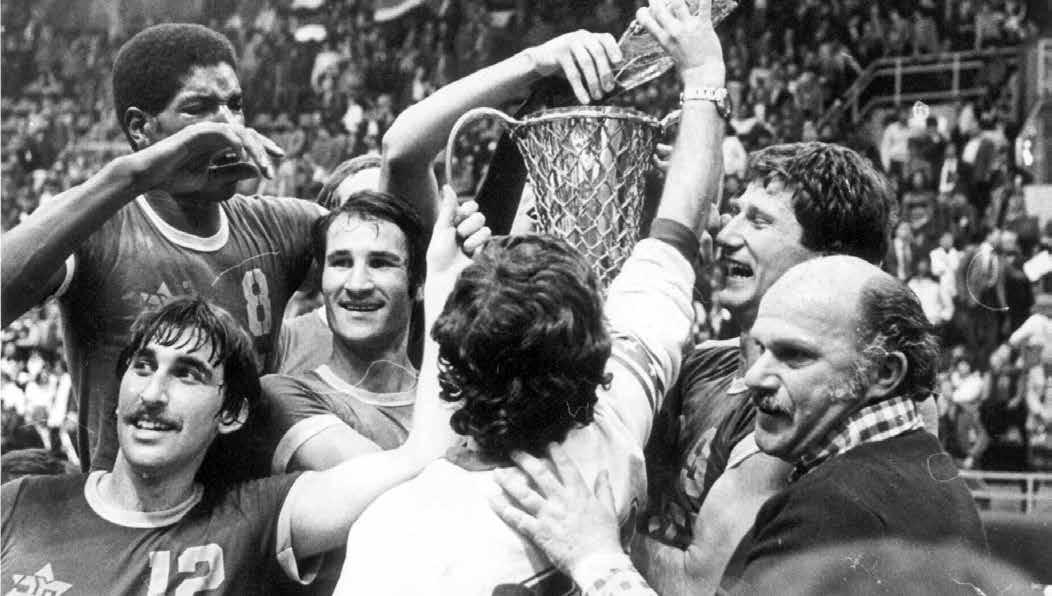
6 minute read
Officer and gentleman MIKI BERKOWITZ The man of the last basket
Miki
Berkowitz
Advertisement
The man of the last basket E very time that Maccabi Tel Aviv visits Pionir Arena in Belgrade, I remember April 7, 1977. That day, Maccabi and Mobilgirgi Varese played the final of the competition we now know as the EuroLeague, the first one I ever saw live. Two years earlier, Israel had been part of the EuroBasket played in Yugoslavia, but it didn’t make the final phase. To be honest, I don’t remember much about the five qualifying games, af ter which Israel finished seventh with an average of 20 points from Miki Berkowitz. But that club final in 1977 was a dramatic game de cided in the last moments. With 7 seconds to go, and with a 78-77 lead for Maccabi, a doubtful call for traveling on Lou Silver allowed Varese a chance to win the game. But great defense by Maccabi managed to maintain that score and allowed the Israeli squad to lift its first European crown ever. That was the first time I saw Miki Berkowitz play. He was the great star of Maccabi. He was only 23 years old, but he was already known as one of the best European players. I remember his name from the under-18 EuroBasket played in Zadar in 1972, where a great Yugoslavia team (formed by Dragan Kicanovic, Mirza Delibasic, Dragan Todoric, Rajko Zizic and Zeljko Jerkov, among others) won the gold medal. However, the best scorer of that tourney was one Miki Berkowitz. Thanks to him, especially, Israel finished fourth.
The stands at Pionir that night in 1977 were yellow and full of Maccabi fans despite the fact that Italy was much closer than Israel. Also, Yugoslavia and Israel didn’t have a diplomatic relationship back then, but the Yugoslav government allowed the Maccabi fans to enter the country without a visa. That was also the first time that a jumbo jet landed in Belgrade. That night, Berkowitz scored 17 points in his first big final. He was the second-best scorer for Maccabi, behind only Jim Boatwright (26). On the other side, stars such as Dino Meneghin (21 points), Bob Morse (20) and Randy Meis ter (7) couldn’t win against the big heart of Berkowitz and his teammates.
History against Washington One year later, on September 8, 1978, Maccabi entered the history books by becoming the first European team to beat an NBA team. And not just any team. Maccabi won 98-97 against the Washington Bullets, the previous NBA champion, a team featuring players like Wes Unseld and Elvin Hayes as big stars and Dick Motta on the bench. Miki Berkowitz scored 26 points in that game.
Berkowitz was a connoisseur of American basket ball. He spent one year at the University of Nevada at Las Vegas and had offers to sign for the New Jersey Nets and the Atlanta Hawks, which would have made him the first European player to enter the NBA. But Maccabi had his rights and he had to go back to Tel Aviv. In the 1979 EuroBasket, with an average of 23.6 points, he led Israel to the silver medal, which is still the biggest international success of the country’s national team. Against France and Spain he scored 33 points, against Italy he had 31, but his most important basket was the last one in a duel against Yugoslavia, which was then both the European and World champion, with its golden generation. Israel won 77-76 and sent Yugosla
101 greats of european basketball101 greats of european basketball Miki Berkowitz
via to the fight for the bronze while Israel entered the great final, which it lost to the USSR 76-98.
During most of his career, Berkowitz played without the existence of three-point baskets, which were intro duced only in the fall of 1984. That surely makes his numbers lower, even though shooting was not his main weapon. I remember him most for his drives, his quick ness, his hands stealing a lot of balls, his sixth sense to find the right spot for the rebound... Miki was also a great defender. He was a complete player and most of all, a winner like he says in his autobiography “Born to Win.” The last shot or the decisive play was always set for him. He liked challenges and didn’t know the meaning of the word “fear.” He decided many games, and many of them were really important.
In the 1981 final of the EuroLeague, in Strasbourg against Virtus Bologna (80-79), he scored the last 5 points for his team. First, with the game tied, he made it 78-75 with a basket-plus-free throw combination. Then he made it 80-77 in the last offensive play by Maccabi. He finished with 20 points, more than Aulcie Perry (18), Earl Williams (17) or Jim Boatwright (14). He took part in another three finals, but Maccabi would lose all of them: 1982 against Cantu (80-86, 16 points); 1987 against Milano again (69-71, 9 points); and 1988 against Milano again (84-90, 3 points) in the first Final Four of the mod ern era, played in Ghent, Belgium.
In 1984, in a tourney in Tel Aviv with Hapoel Tel Aviv, the New Jersey Nets and the Phoenix Suns, Maccabi repeated the heroism of six years before. The first day it beat the Nets 104-97 with 26 points by Berkowitz and 23 by Kevin Magee, and in the final Maccabi de feated the Suns 113-98 with 36 points by Magee, 28 by Lee Johnson and 20 by Berkowitz. Thanks to him, Israel played in its only World Championship in 1986,
winning the qualifying tourney in the last game against Czechoslovakia 92-90, with his basket on the last offense. In the Worlds that followed in Spain, Miki av eraged 16.8 points. In his seven EuroBaskets between 1973 and 1985, only in the first one (6.4 ppg.) and the last one (15.3 ppg.) did Berkowitz average below 20 points.
Israeli Legend Apart from being considered the best basketball player of all time in Israel, Miki Berkowitz is among the most famous people ever in that country. A survey on the Ynet portal once put him in 35th place in a list of the 200 most popular figures of the history of Israel. He was even named “King of Israel” by the local press. He handled his fame naturally, as he was always a humble and kind man.
A role model. His two sons followed the tradition and even man aged to play in the Israeli first division, but the Berkowitz last name was more a curse than a blessing and their performances were always compared to those of their irreplaceable father.
I can offer you some more numbers on Berkowitz: • Second best scorer of all time in the Israeli League with 8,465 points, behind only Doron Jamchy. • 3,588 points for Maccabi in 211 EuroLeague-level games. • 2,842 points in 165 games with the Israeli national team. • Best scoring performance in an Israeli League game was 42 points. • Best scoring performance with the Israeli national team was 44 points against Turkey in the 1975 EuroBasket.
At the end of his playing career – he retired in 1995 – Berkowitz played with his great friend Motti Aroesti in Maccabi Rishon and also in Hapoel Jerusalem and Hapoel Tel Aviv. He was also the owner of the Ramat HaSharon club and general manager at Ironi Nahariya. Though Berkowitz wore number 9 on his back, he was a 10 as a player!











